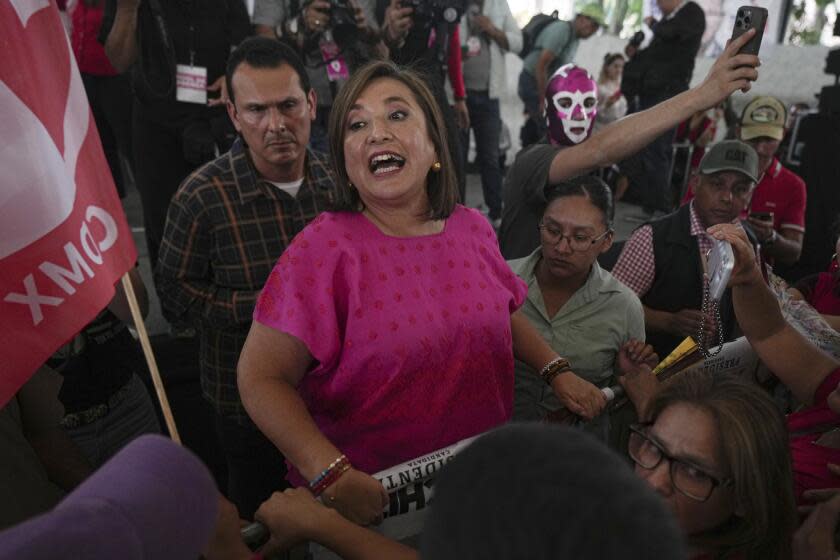Opinion: Mexico's June 2 election has already made history — for violence

On Sunday, Mexicans will go to the polls to vote on more than 20,000 elected positions in the largest election in a generation. This year’s vote will also likely yield the country’s first woman president — former Mexico City Mayor Claudia Sheinbaum or Sen. Xóchitl Gálvez. As elections experts and democracy professionals, we are watching this historic democratic exercise with excitement — and concern. Mexico’s electoral machinery is struggling in the face of violence and threats. The quality of the Mexican vote matters to the United States because the challenges our ally and biggest trading partner faces — northward migration, economic development and narcotrafficking — are our challenges too. Solving them starts with free, fair elections that deliver a strong mandate to Mexico’s leaders.
Read more: Mexico making history: The country is on track to elect its first woman as president
This electoral cycle in Mexico is already the most violent in recent memory. In the seven months from September to May 2, 560 victims suffered lethal and nonlethal electoral violence; there have been at least 195 election-related killings, including at least 34 candidates. In the last election cycle, 2020-21, among 299 victims of election-related violence, there were 88 killings. Turf wars in recent months between battling cartels and organized crime syndicates are putting candidates and politicians in the crosshairs at the local level and in a handful of states in central and southern Mexico.
These trends mean that many of the candidates who survive the campaign and win office in regions most affected by electoral violence will be at least suspected of responding not to voters, but to the interests of those that allowed them to take office. Gregorio Portillo Mendoza, a former mayor of Zirándaro, in the state of Guerrero, was kidnapped and tortured by members of the Cártel de Jalisco Nueva Generación for refusing to take sides in their turf war with the Familia Michoacana. “Here, the mayors do not govern,” he told the newspaper El Universal. “It is the cartels that govern.”
Read more: Mexico owes its young democracy to its elections institute. The president wants to dismantle it
Meanwhile, Mexico’s widely respected National Electoral Institute, which oversees state and federal elections, is on the defensive. President Andrés Manuel López Obrador and his Morena-party-led majority in Congress has been working to undermine the institute’s independence and power through reputational attacks, by not making key appointments, and by staff reductions and successive budget cuts.
Mexico’s Electoral Tribunal of the Federal Judicial Power, which is responsible for certifying results at the federal and state level, is also in disarray. Appointments meant to fill two of its magistrate vacancies were blocked, and the magistrate-president, Reyes Rodriguez Mondragon, was forced to resign just six months before the elections. State and local tribunals have also been hollowed out; more than a third of state magistrate positions remain vacant (36 of 107).
Read more: Thousands rail against Mexico's president and ruling party in 'march for democracy'
Aware of its own limitations in a highly charged political and social environment, the Electoral Tribunal partnered with more than 40 nongovernmental, academic and private sector organizations, as well as National Electoral Institute councilors and representatives from local electoral bodies, to create a watchdog group to preserve electoral integrity. The National Agreement for Electoral Integrity and other civil society groups are no replacement for strong and independent state institutions, but they play the critical role of encouraging transparency of institutions like the institute and the tribunal.
The United States can help Mexico’s electoral institutions by first publicly calling on the Mexican government to protect the candidates and their campaigns. Even at this late hour, the Biden administration can help mobilize funding for election observers throughout the country. It can specifically aid watchdogs such as the electoral integrity coalition, as they monitor, document and report irregularities. Following the elections, the U.S. can make it a diplomatic priority to encourage Mexico to reinvigorate its key electoral institutions. Even if organized crime succeeds in influencing election outcomes — via violence or fraud — these institutions are critical to investigating, punishing and rectifying electoral crimes and corruption moving forward.
Antonio Garrastazu is the senior director for Latin America and the Caribbean at the nonpartisan International Republican Institute. Patrick Quirk is vice president for strategy, innovation and impact at the IRI. From 2018 to 2019, he served on the U.S. secretary of State’s policy planning staff.
This story originally appeared in Los Angeles Times.


